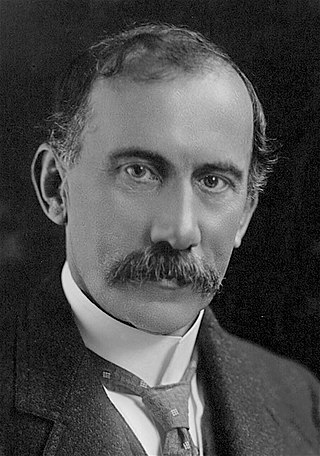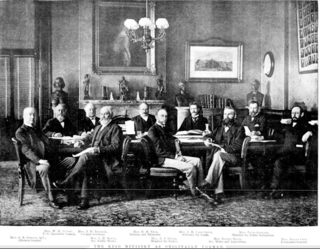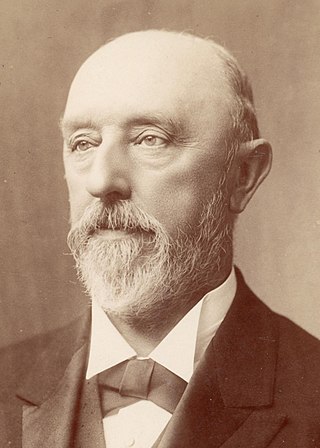
William Guy Higgs was an Australian politician who served in both the Senate and the House of Representatives. He was a Senator for Queensland from 1901 to 1906, and then represented the Division of Capricornia in the House of Representatives from 1910 to 1922. He served as Treasurer of Australia from 1915 to 1916, under Billy Hughes.

George Henry Thorn (junior) was a Member of the Queensland Legislative Assembly and a Premier of Queensland, Australia.
The 1899 New Brunswick general election was held on 18 February 1899, to elect 46 members to the 30th New Brunswick Legislative Assembly, the governing house of the province of New Brunswick, Canada. The election was held before the adoption of party labels.

Bernhard Ringrose Wise, commonly referred to as B. R. Wise, was an Australian politician. He was a social reformer, seen by some as a traitor to his class, but who was not fully accepted by the labor Movement. He said, "My failure in Sydney has been so complete—my qualities those which Australia does not recognise, my defects those which Australians dislike most." When he died, William Holman said, "There is hardly anything in our public life which we have to consider to-day that cannot be traced back to his brilliant mind and clear foresight … [Wise] held undisputed supremacy as the foremost debater, foremost thinker and foremost public man in the life of New South Wales".
The following is a list of members of the Western Australian Legislative Assembly between the 1897 elections and the 1901 elections, together known as the Third Parliament.
Ohinemuri is a former New Zealand parliamentary electorate. It existed from 1896 to 1928, and was represented by five Members of Parliament.
Wakatipu was a parliamentary electorate in the Otago region of New Zealand, from 1871 to 1928.
Mataura was a parliamentary electorate in the Southland Region of New Zealand, from 1866 to 1946.
Members of the New South Wales Legislative Assembly who served in the 18th parliament of New South Wales held their seats between 1898 and 1901. They were elected at the 1898 colonial election on 27 July 1898. The Speaker was Sir Joseph Abbott until 12 June 1900 and then William McCourt.

The 1898–99 United States Senate elections were held on various dates in various states. As these U.S. Senate elections were prior to the ratification of the Seventeenth Amendment in 1913, senators were chosen by state legislatures. Senators were elected over a wide range of time throughout 1898 and 1899, and a seat may have been filled months late or remained vacant due to legislative deadlock. In these elections, terms were up for the senators in Class 1.

The 1900–01 United States Senate elections were held on various dates in various states, coinciding with President William McKinley's re-election as well as the 1900 House of Representatives elections. As these U.S. Senate elections were prior to the ratification of the Seventeenth Amendment in 1913, senators were chosen by state legislatures. Senators were elected over a wide range of time throughout 1900 and 1901, and a seat may have been filled months late or remained vacant due to legislative deadlock. In these elections, terms were up for the senators in Class 2.
The 1899 United States Senate election in Massachusetts was held during January 1899. Republican incumbent Henry Cabot Lodge won election to a second term easily.

The Reid ministry was the 28th ministry of the Colony of New South Wales, and was led by the 12th Premier, George Reid. The title of Premier was widely used to refer to the Leader of Government, but was not a formal position in the government until 1920. Instead the Premier was appointed to another portfolio, usually Colonial Secretary but on this occasion Reid took the portfolio of Colonial Treasurer until July 1899 and then Attorney General.

The 1901 United States Senate special election in Pennsylvania was held on January 15, 1901, after the regularly scheduled legislative election in January—April 1899 failed to elect a Senator. Former Senator Matthew Quay, who had left the Senate for nearly two years because of the political stalemate, was again elected by the Pennsylvania General Assembly to the United States Senate.

Castlemaine was an electoral district of the Legislative Assembly in the Australian state of Victoria from 1859 to 1904. It included the towns of Castlemaine, Muckleford and Harcourt.

Elections were held in the Colony of Queensland between 1 March 1899 and 25 March 1899 to elect the members of the colony’s Legislative Assembly.
Members of the New South Wales Legislative Council who served from 1898 to 1901 were appointed for life by the Governor on the advice of the Premier. This list includes members between the election on 27 July 1898 and the election on 3 July 1901. The President was Sir John Lackey.

The 1898 Minnesota Senate election was held in the U.S. state of Minnesota on November 8, 1898, to elect members to the Senate of the 31st and 32nd Minnesota Legislatures.
A by-election was held for the New South Wales Legislative Assembly electorate of Boorowa on 30 September 1899 because Kenneth Mackay (Protectionist) resigned to accept an appointment to the Legislative Council.